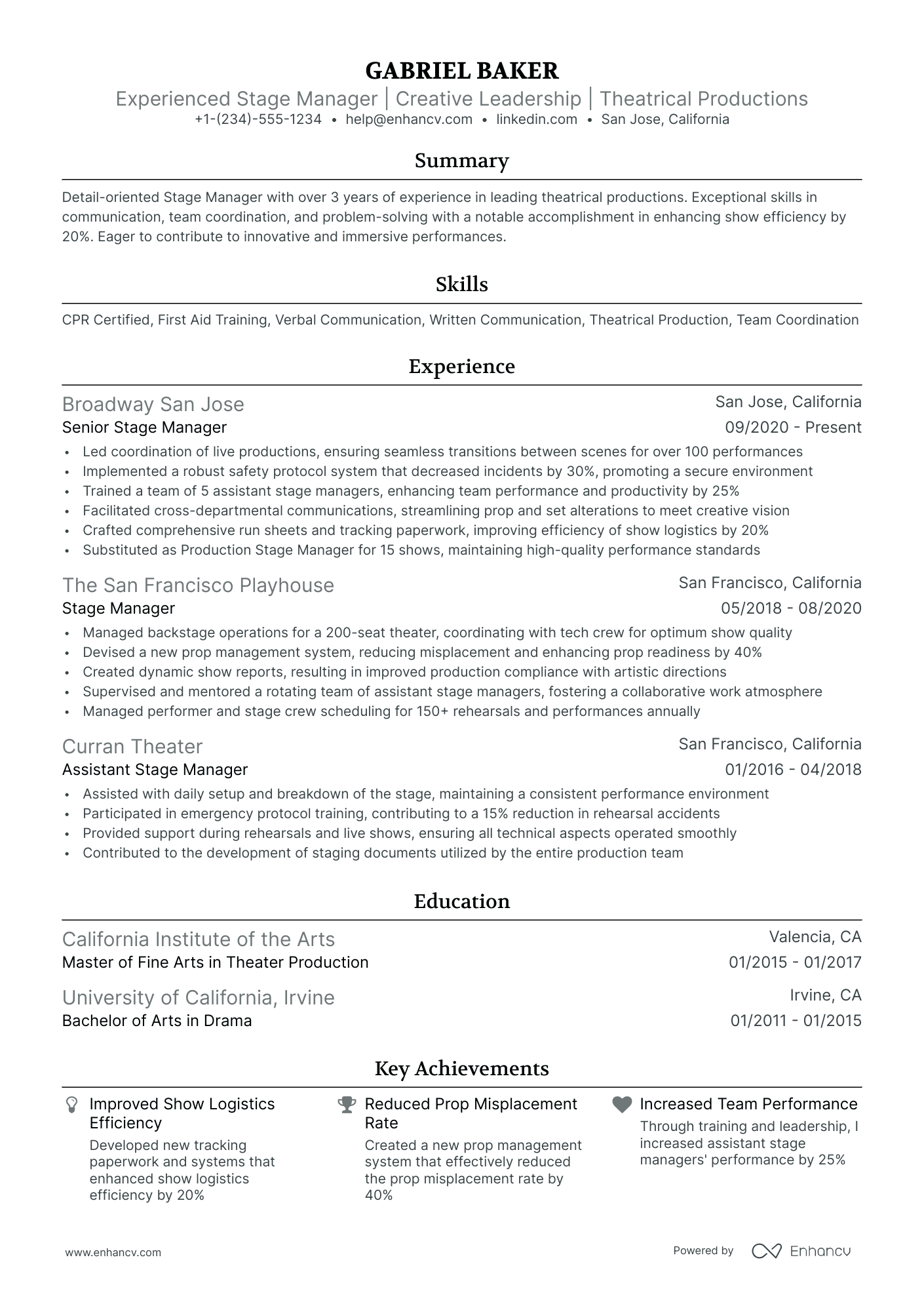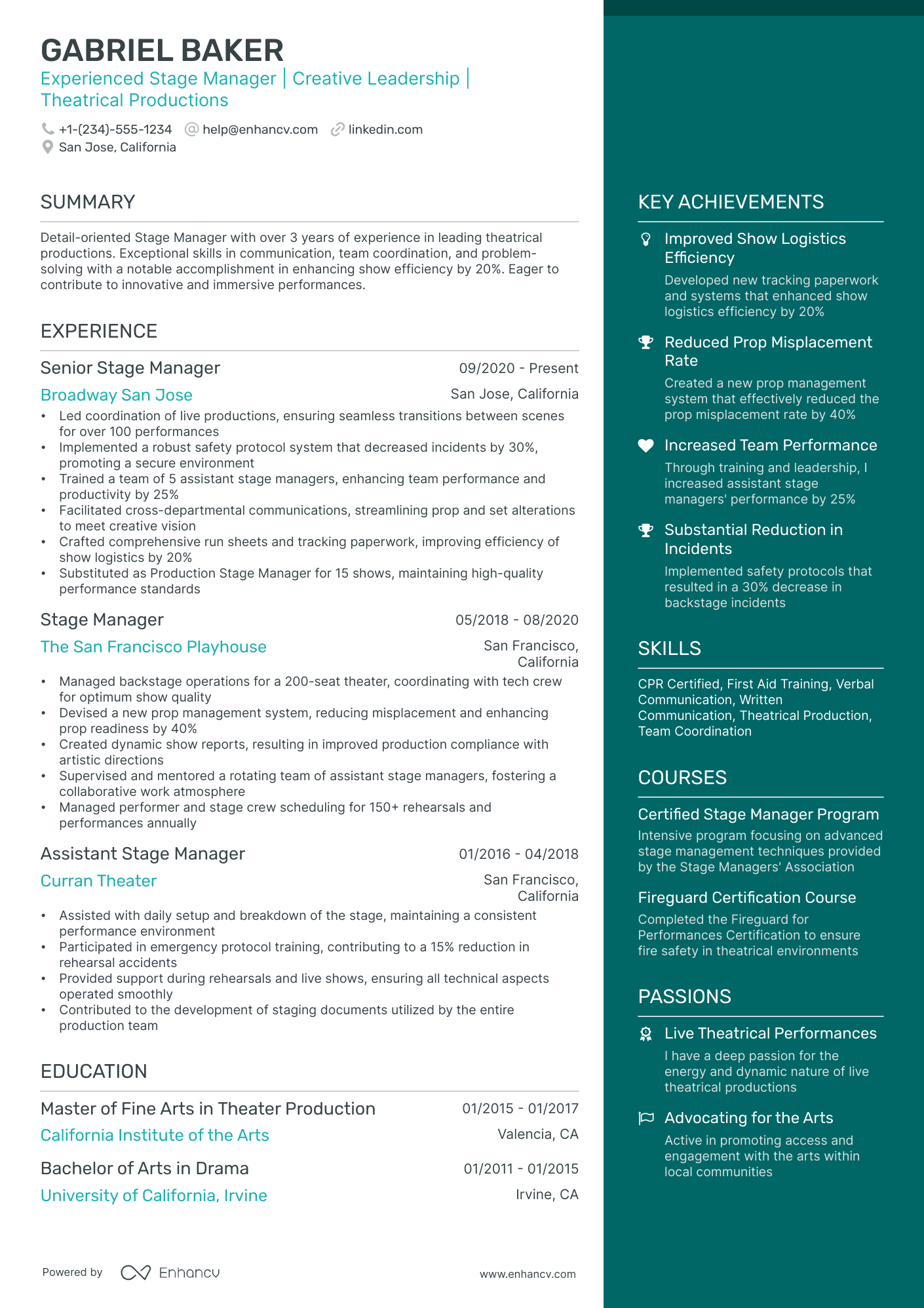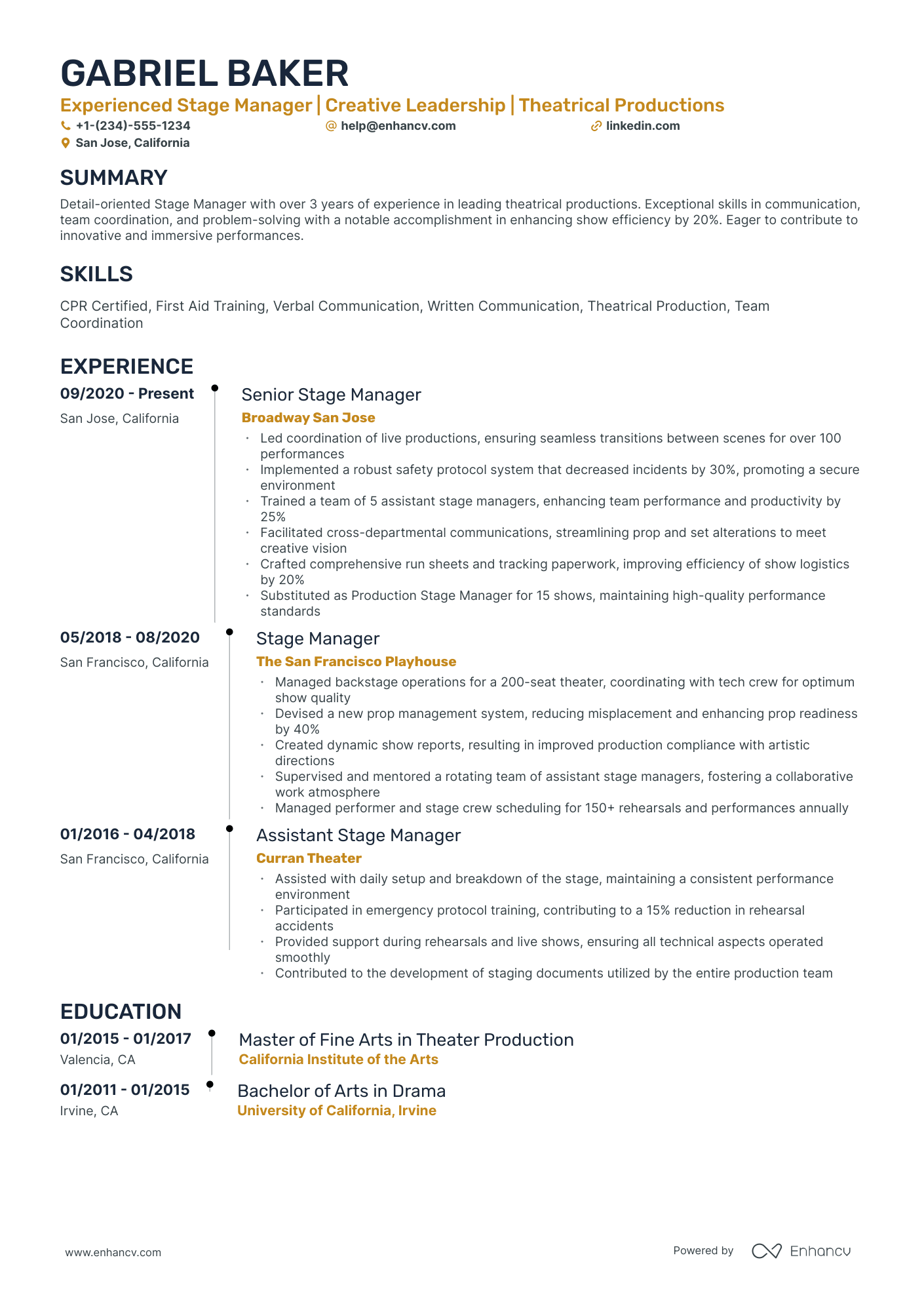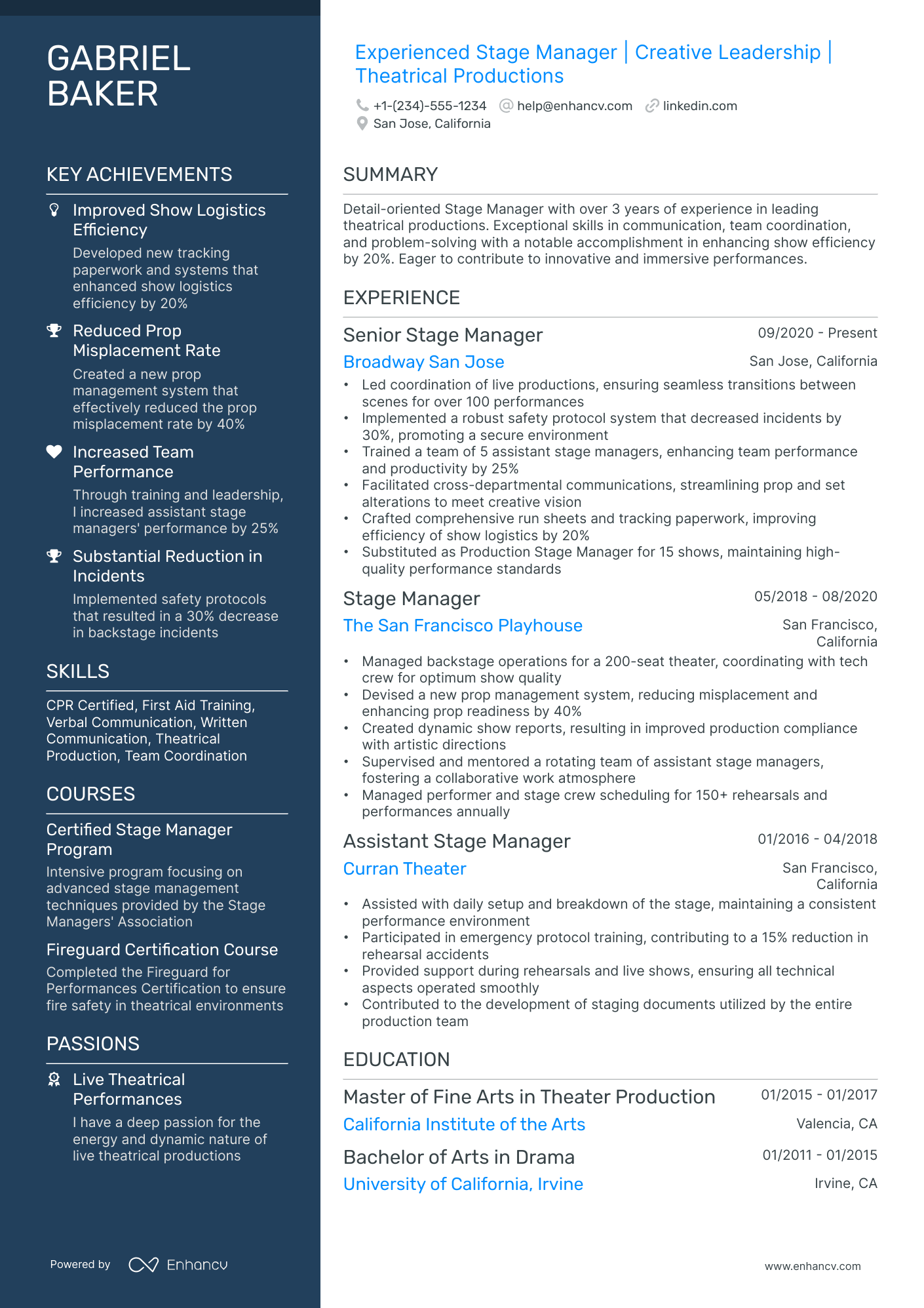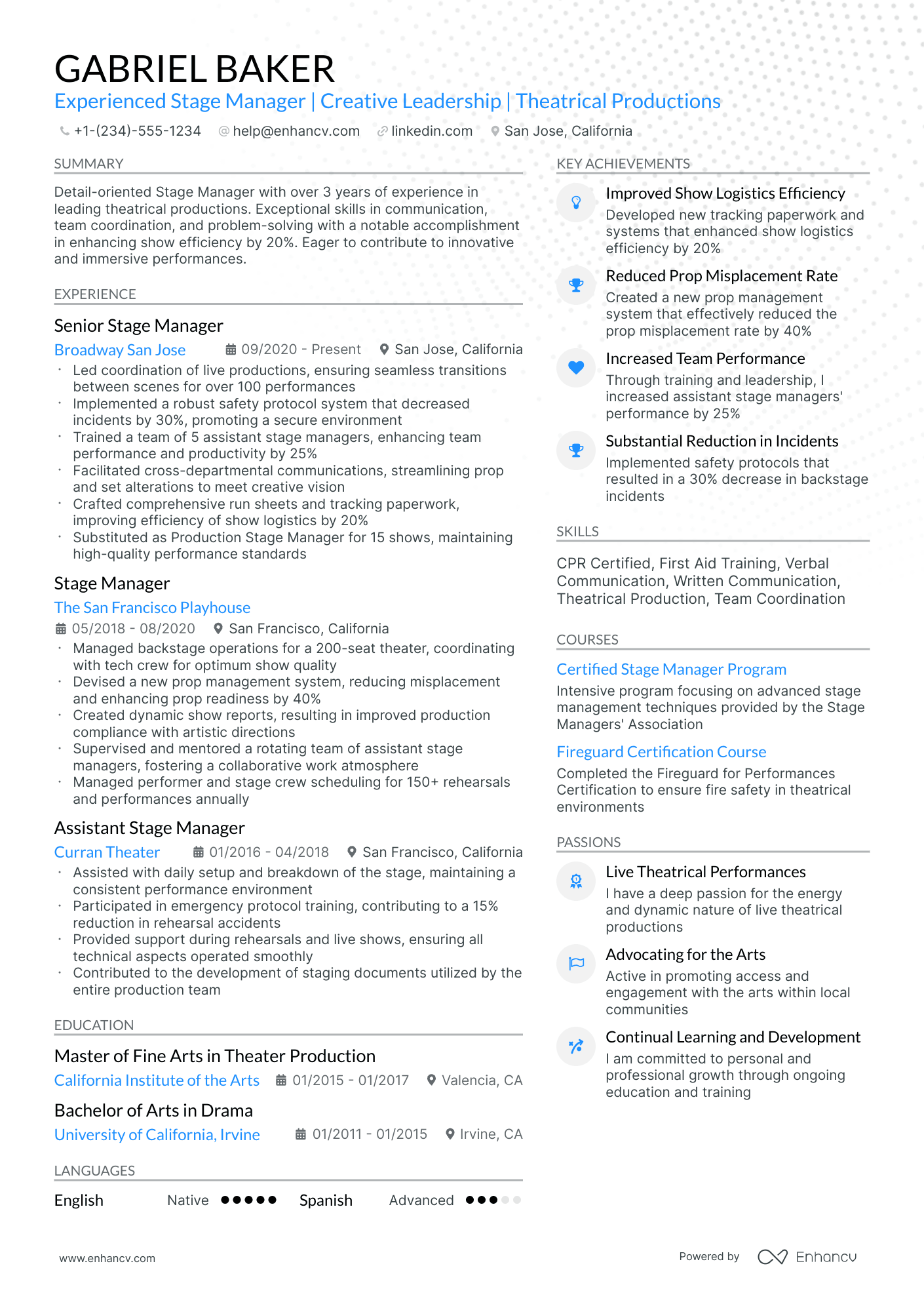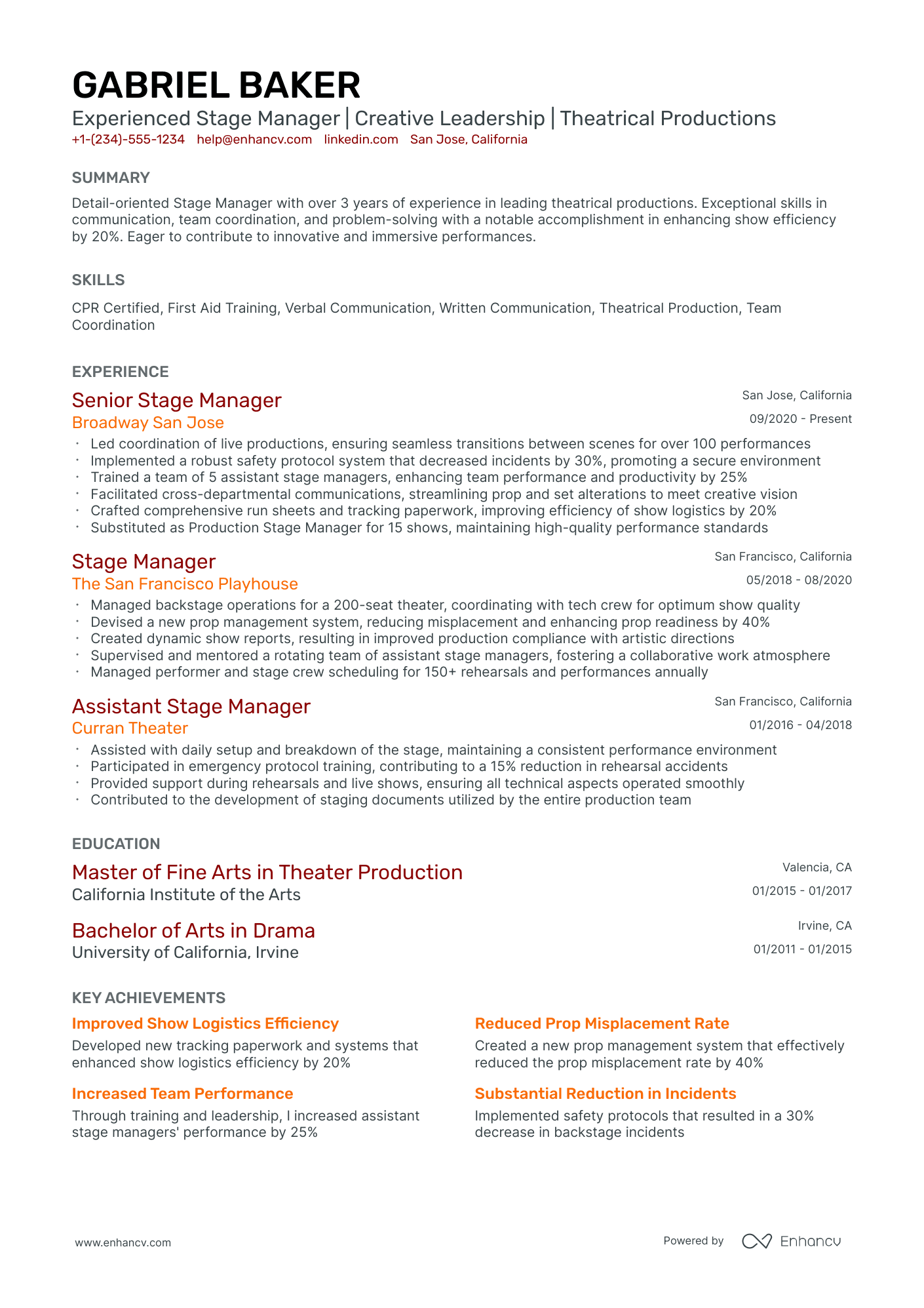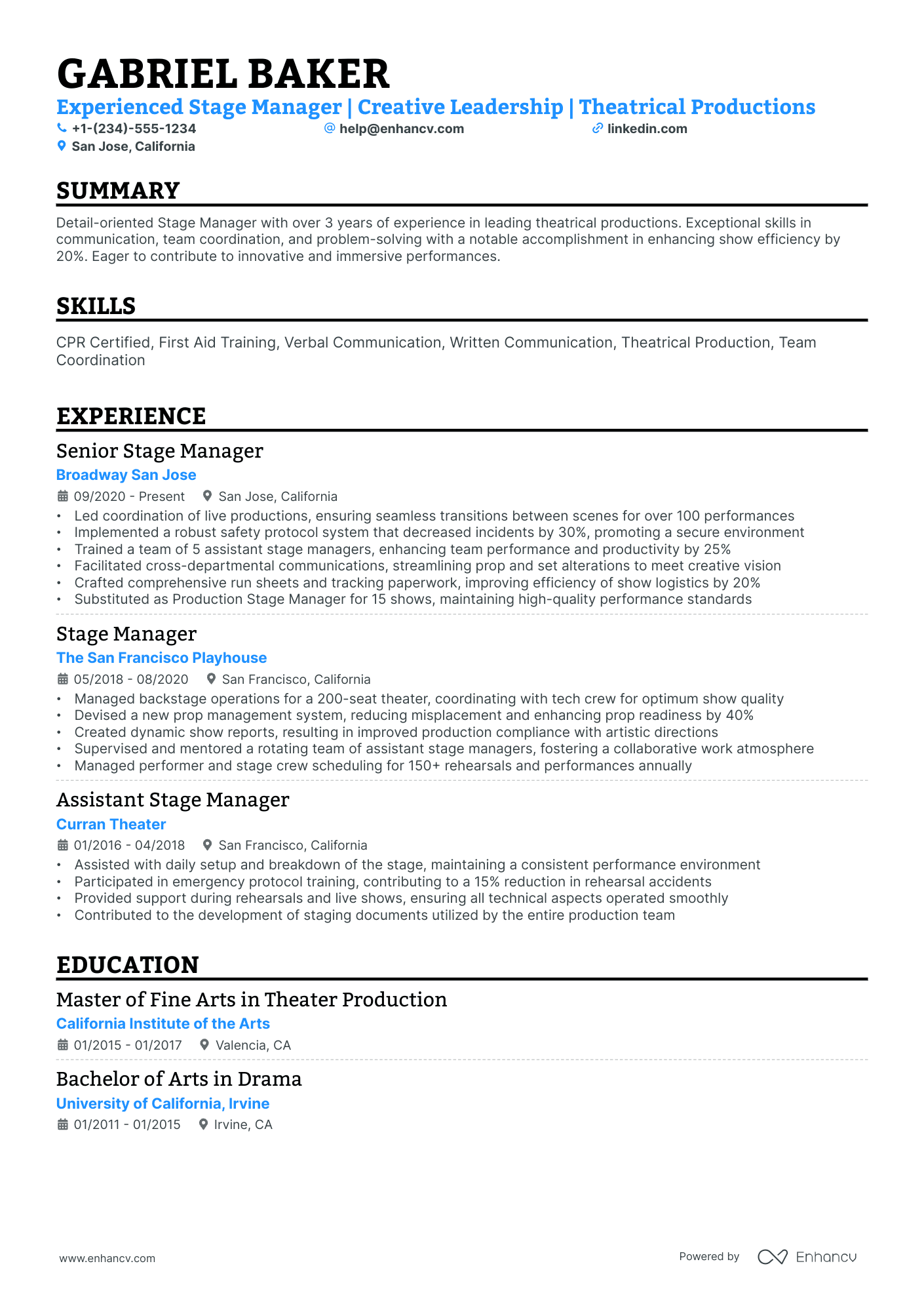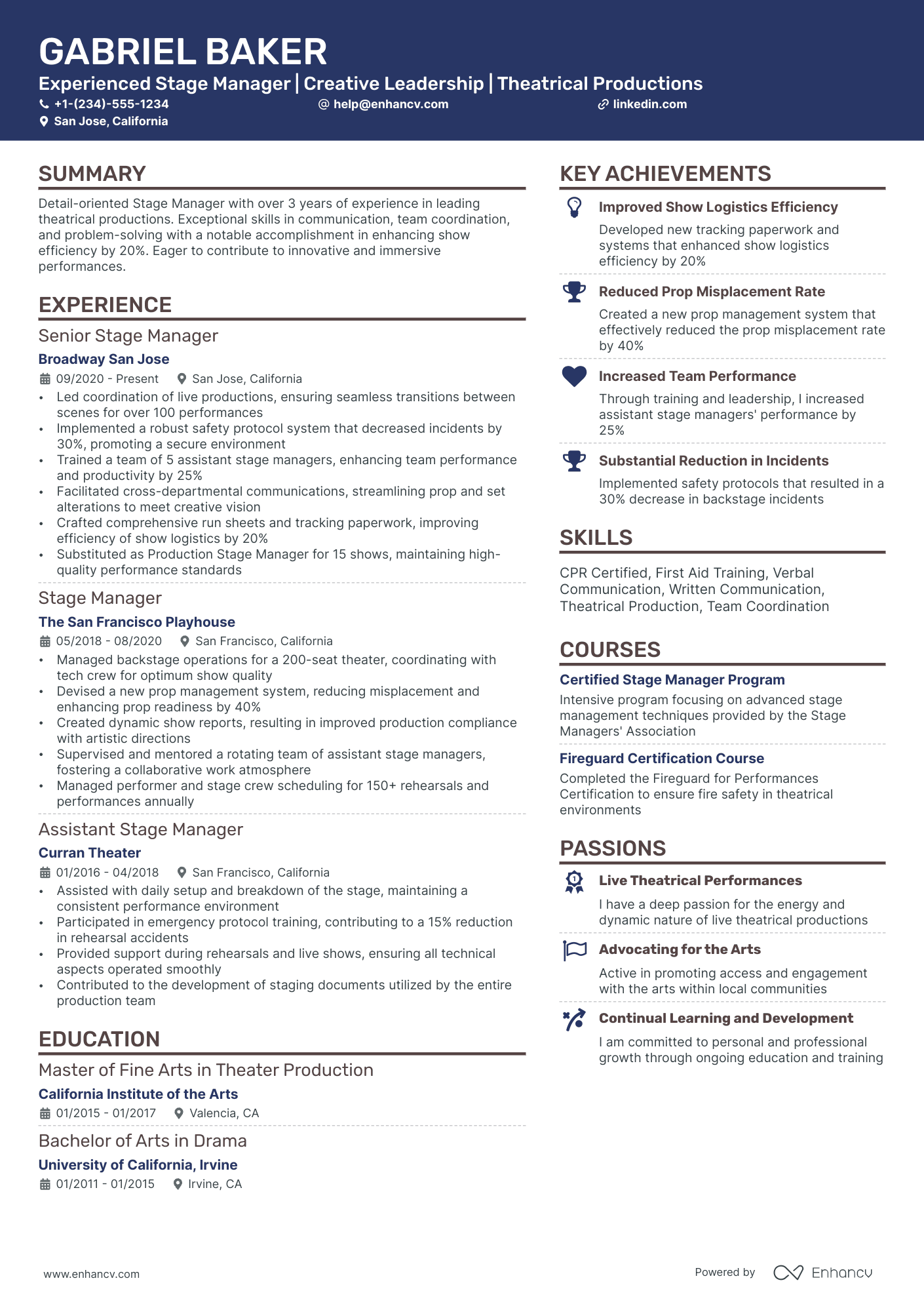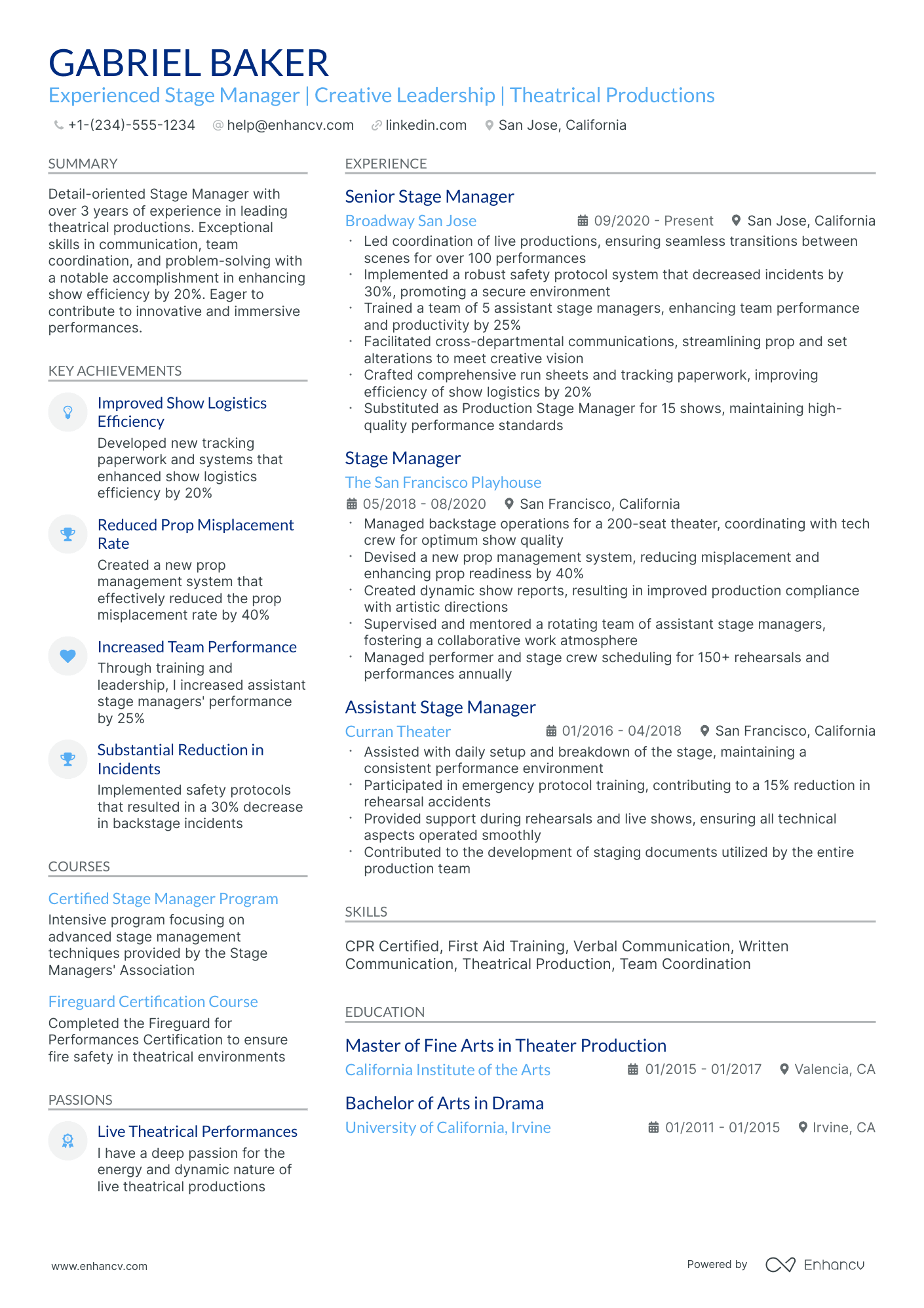As a stage manager, effectively capturing the breadth of your backstage expertise and multitasking skills on your resume can be particularly challenging. Our guide is tailored to help you distil your diverse experience into a clear and compelling resume, ensuring that every cue of your backstage prowess is showcased to potential employers.
- The most effective stage manager resume samples, reflecting on experience and skills.
- +10 simple, yet impactful methods to tailor your stage manager resume to the job advert.
- Using your professional achievements as the North Star to your unique value as a stage manager candidate.
- 'No one cares about your education nowadays …' Let's prove this statement wrong with the best-kept industry secrets to your education and certifications.
If the stage manager resume isn't the right one for you, take a look at other related guides we have:
Stage manager resume format made simple
You don't need to go over the top when it comes to creativity in your stage manager resume format .
What recruiters care about more is the legibility of your stage manager resume, alongside the relevancy of your application to the role.
That's why we're presenting you with four simple steps that could help your professional presentation check all the right boxes:
- The reverse-chronological resume format is the one for you, if you happen to have plenty of relevant (and recent) professional experience you'd like to showcase. This format follows a pretty succinct logic and puts the focus on your experience.
- Keep your header simple with your contact details; a headline that details the role you're applying for or your current job; and a link to your portfolio.
- Ensure your resume reaches an up-to-two-page limit, only if you happen to be applying for a more senior role or you have over a decade of relevant experience.
- Save your stage manager resume as a PDF to retain its structure and presentation.
Customize your resume for the market – a Canadian format, for example, might vary in structure.
Upload & Check Your Resume
Drop your resume here or choose a file. PDF & DOCX only. Max 2MB file size.
PRO TIP
If you're in the process of obtaining your certificate or degree, list the expected date you're supposed to graduate or be certified.
Essential sections that should make up your stage manager resume include:
- The header - with your contact details (e.g. email and telephone number), link to your portfolio, and headline
- The summary (or objective) - to spotlight the peaks of your professional career, so far
- The experience section - with up to six bullets per role to detail specific outcomes
- The skills list - to provide a healthy mix between your personal and professional talents
- The education and certification - showing your most relevant degrees and certificates to the stage manager role
What recruiters want to see on your resume:
- Experience managing live performances, including rehearsals, tech runs, and actual shows
- Proficiency in stage management software (e.g., QLab, StageWrite, or other related software)
- Demonstrated ability to coordinate and communicate effectively with directors, actors, technicians, and designers
- Proven skill in creating and maintaining comprehensive production paperwork (e.g., prompt scripts, cue sheets, stage plots)
- Strong crisis management and problem-solving skills specific to live production scenarios
Essential tips for crafting your stage manager resume experience section
The experience section is indeed the core of your stage manager resume. It's where you present your past and current job roles. But how should you approach this crucial part?
A common error is treating the experience section as merely a list of job duties. Many candidates fall into the trap of detailing what they did without illustrating the impact of their actions.
To effectively write your stage manager resume experience section, consider these guidelines:
- Emphasize your achievements, supported by concrete metrics such as percentages, revenue increases, or customer satisfaction rates;
- Avoid using generic buzzwords like communication, hard work, or leadership. Instead, demonstrate how these skills added value in your previous roles;
- Begin each bullet point with a strong action verb, followed by a skill, and then the result of your actions;
- Tailor your resume for each job application by selecting the most relevant experiences, responsibilities, and successes.
We have an array of resume examples that illustrate how to optimally curate your stage manager resume experience section.
- Effectively coordinated a team of 25 cast and crew for a major Broadway production, ensuring seamless communication and timely execution of performances.
- Improved backstage efficiency by 30% through the implementation of a new digital script management system, allowing for quick and accurate cue execution.
- Managed a budget exceeding $500,000, while negotiating contracts with vendors and optimizing resources, which reduced production costs by 15% without compromising quality.
- Spearheaded the technical setup for over 100 performances in an off-Broadway theatre while maintaining strict adherence to safety protocols.
- Developed and maintained an extensive stage management database which improved the historical archive of past productions and facilitated smoother transitions between shows.
- Led a project team through the high-stress tech week process for a critically acclaimed production, culminating in a 95% sold-out run.
- Orchestrated the logistical planning and execution for a traveling theatre troupe, enhancing audience reach to over 30 cities nationwide.
- Implemented eco-friendly stage practices, reducing the production's carbon footprint by 20% through innovative recycling and energy-saving lighting techniques.
- Cultivated a strong sense of team unity and professionalism, resulting in zero missed cues and a 50% reduction in on-stage mishaps during live performances.
- Managed all aspects of stage operations for a prominent opera company, ensuring top-tier productions in line with the artistic director's vision.
- Negotiated with local unions to streamline work rules for stagehands, leading to a 10% decrease in labor costs while upholding production standards.
- Led a talent development initiative which helped novice stagehands gain expertise, resulting in 5 individuals being promoted to lead positions.
- Successfully launched a community theater's inaugural season, building the operational framework from the ground up and contributing to a sold-out first year.
- Developed a versatile prop and costume tracking system to minimize expenditures, which led to a sustainable model for future productions.
- Created a comprehensive risk management plan that significantly reduced the frequency of onstage accidents and ensured compliance with local safety regulations.
- Oversaw stage management operations for a series of high-profile musical theater festivals, coordinating between multiple venues and production teams to ensure consistent quality.
- Introduced a real-time feedback loop with directors and technical teams, increasing overall production quality and audience satisfaction ratings by 25%.
- Managed complex scheduling for a diverse cast of international performers, streamlining the rehearsal process and reducing time conflicts by 40%.
- Facilitated the development and premiere of an award-winning experimental play, which involved complex multimedia elements and non-traditional staging techniques.
- Collaboratively worked with the director to integrate technological advancements in lighting and sound, increasing engagement and setting a new standard for future productions.
- Coordinated an educational outreach program alongside the production, bringing theater to over 2,000 students and fostering community involvement in the arts.
- Supervised stage operations for a large-scale outdoor Shakespeare festival, handling the unique challenges of open-air productions and fluctuating weather conditions.
- Launched a successful patron engagement initiative which included post-show discussions and backstage tours, thereby enhancing the festival's community presence.
- Cultivated vendor relationships that led to more cost-effective set designs and construction, effectively decreasing set production costs by 20%.
The following content includes information from "O*NET OnLine" by the U.S. Department of Labor, Employment and Training Administration (USDOL/ETA). Used under the CC BY 4.0 license. The data represents the top responsibilities present on the task lists for stage manager professionals.
Top Responsibilities for Stage Manager:
- Plan details such as framing, composition, camera movement, sound, and actor movement for each shot or scene.
- Communicate to actors the approach, characterization, and movement needed for each scene in such a way that rehearsals and takes are minimized.
- Direct live broadcasts, films and recordings, or non-broadcast programming for public entertainment or education.
- Research production topics using the internet, video archives, and other informational sources.
- Review film, recordings, or rehearsals to ensure conformance to production and broadcast standards.
- Study and research scripts to determine how they should be directed.
- Supervise and coordinate the work of camera, lighting, design, and sound crew members.
- Confer with technical directors, managers, crew members, and writers to discuss details of production, such as photography, script, music, sets, and costumes.
- Perform management activities, such as budgeting, scheduling, planning, and marketing.
- Consult with writers, producers, or actors about script changes or "workshop" scripts, through rehearsal with writers and actors to create final drafts.
Quantifying impact on your resume
- Detail the number of theatrical productions managed to demonstrate extensive experience in the field.
- Specify the size of casts and crews coordinated to highlight organizational and leadership skills.
- Mention the budget sizes managed to showcase financial responsibility and budgeting expertise.
- Quantify the total number of performances overseen to reflect reliability and endurance.
- Indicate the number of changes made to original stage designs to show adaptability and problem-solving abilities.
- List the percentage of shows that started on time under your stage management to demonstrate efficiency.
- Include the number of positive reviews where your work was specifically mentioned to validate your impact on production quality.
- Highlight the reduction in rehearsal time due to your management optimizations to illustrate time-management skills.
Action verbs for your stage manager resume
Stage manager resume without experience: a walk-through guide
If you don't happen to have any relevant experience yet, you can substitute this with:
- Short-term gigs and stunts - like month-long internships, that you have done during your university days
- Contract work - be specific about the relevance and outcomes of each role you include
- Resume format that prioritizes your skills - the functional-skill-based format or hybrid format could work
- Research roles - feature those especially prominently if you've participated in a noteworthy project or your role was of utmost importance to the project's success.
Recommended reads:
PRO TIP
Showcase any ongoing or recent educational efforts to stay updated in your field.
The right balance between hard skills and soft skills for your stage manager resume
Wondering what the perfect stage manager resume looks like? The candidate's profile meets job requirements by balancing both hard skills and soft skills across their resume.
- Hard skills are all the technologies you're apt at using . Prove you have the right technical background by listing key industry hardware/software in your stage manager resume skills section and noteworthy certifications.
- Soft skills are both your personal, mindset, communication, analytical, and problem-solving talents . Use your stage manager resume achievements section to show how you've used a particular soft skill to reach a tangible outcome.
When writing about your unique skill set, always make sure to refer back to the job advert to see what are the key requirements. This ensures you've tailored your resume so that it matches closer to what the ideal candidate profile is.
Top skills for your stage manager resume:
Stage Management Software
Audio Mixing Equipment
Lighting Control Systems
Rigging Equipment
Video Projection Systems
Communication Devices (e.g., headsets, intercoms)
Scheduling Software
Script Management Tools
Stage Design Software
Safety Protocols and Equipment
Leadership
Communication
Problem-Solving
Time Management
Teamwork
Adaptability
Attention to Detail
Conflict Resolution
Organizational Skills
Creativity
Next, you will find information on the top technologies for stage manager professonals from "O*NET OnLine" by the U.S. Department of Labor, Employment and Training Administration (USDOL/ETA). Used under the CC BY 4.0 license.
Top technologies for Stage Manager’s resume:
- TikTok
- YouTube
- WordPress
- Adobe Creative Cloud software
- Canva
PRO TIP
Showcase any ongoing or recent educational efforts to stay updated in your field.
Education section and most popular stage manager certifications for your resume
Your resume education section is crucial. It can indicate a range of skills and experiences pertinent to the position.
- Mention only post-secondary qualifications, noting the institution and duration.
- If you're still studying, highlight your anticipated graduation date.
- Omit qualifications not pertinent to the role or sector.
- If it provides a chance to emphasize your accomplishments, describe your educational background, especially in a research-intensive setting.
Recruiters value stage manager candidates who have invested their personal time into their professional growth. That's why you should include both your relevant education and certification . Not only will this help you stand out amongst candidates, but showcase your dedication to the field. On your stage manager resume, ensure you've:
- Curated degrees and certificates that are relevant to the role
- Shown the institution you've obtained them from - for credibility
- Include the start and end dates (or if your education/certification is pending) to potentially fill in your experience gaps
- If applicable, include a couple of job advert keywords (skills or technologies) as part of the certification or degree description
If you decide to list miscellaneous certificates (that are irrelevant to the role), do so closer to the bottom of your resume. In that way, they'd come across as part of your personal interests, instead of experience. The team at Enhancv has created for you a list of the most popular stage manager certificates - to help you update your resume quicker:
The top 5 certifications for your stage manager resume:
- ETCP Certified Rigger - Arena (ETCP-CRA) - Entertainment Technician Certification Program
- ETCP Certified Entertainment Electrician (ETCP-CEE) - Entertainment Technician Certification Program
- OSHA 30-Hour Training (OSHA 30) - Occupational Safety and Health Administration
- First Aid/CPR/AED Certification - American Red Cross or American Heart Association
- Certified Technology Specialist (CTS) - AVIXA (Audiovisual and Integrated Experience Association)
The content below includes information from "O*NET OnLine" by the U.S. Department of Labor, Employment and Training Administration (USDOL/ETA). Used under the CC BY 4.0 license. The data represents the top associations for stage manager professionals.
Top US associations for a Stage Manager professional
- Actors' Equity Association
- Alliance of Motion Picture and Television Producers
- American Advertising Federation
- Association for Women in Communications
- Communications Workers of America
PRO TIP
Always remember that your stage manager certifications can be quantified across different resume sections, like your experience, summary, or objective. For example, you could include concise details within the expertise bullets of how the specific certificate has improved your on-the-job performance.
Recommended reads:
Stage manager resume summaries or objectives: real-world samples for best industry practices
Grasp recruiters' attention from the get-go of your application with a professional stage manager resume summary or objective.
It's wise to select the:
- Resume objective , if you don't happen to have much experience alignment and would like to more prominently feature your dreams and personality.
- Resume summary , if you'd like to have a more standard approach to your application and feature up to five career highlights to help you stand out.
Writing your resume summary or objective should be tailored to each role you apply for.
Think about what would impress the recruiters and go from there.
But, if you need further help with this introductory section, check out some real-world samples in the next part of this guide:
Resume summaries for a stage manager job
- With over a decade of experience orchestrating backstage operations at reputable theaters in Broadway, this seasoned stage manager combines meticulous attention to detail with a proven track record of successful show launches, including the award-winning 'Ephemeral Nights' musical that saw record attendance figures.
- Transitioning from a robust 7-year career in event planning, this proficient organizer brings top-notch coordination skills to the stage management realm, eager to apply a rich background in logistics management and vendor coordination to ensuring seamless theatrical productions.
- Armed with a dual degree in Theater Arts and Communication, this former corporate project manager seeks to leverage 8 years of team leadership and complex project execution into crafting unforgettable live performances while maintaining a high standard of production excellence and crew morale.
- Enthusiastic about merging a 5-year background in tech management with a lifelong passion for the arts, this innovative professional is poised to offer cutting-edge technical expertise and a fresh perspective on stage management, aiming to elevate traditional theater experiences with modern technological integration.
- Aspiring to carve out a career in stage management, this fresh graduate with intern experience at a local playhouse is eager to utilize a keen eye for detail and a strong educational foundation in performance arts to bring creativity and efficiency to upcoming productions, fosters teamwork and artist support.
- Determined to transition into stage management, this passionate individual with extensive volunteer experience assisting at festival events and a natural flair for organization is motivated to learn quickly, support artists, and contribute to crafting memorable and smoothly executed theatrical performances.
Average salary info by state in the US for stage manager professionals
Local salary info for Stage Manager.” Source: My Next Move, National Center for O*NET Development. Accessed 10/15/2024
| State | Average Salary (in USD) |
|---|---|
| US National Average | $82,510 |
| California (CA) | $105,080 |
| Texas (TX) | $61,830 |
| Florida (FL) | $76,780 |
| New York (NY) | $103,260 |
| Pennsylvania (PA) | $64,120 |
| Illinois (IL) | $75,350 |
| Ohio (OH) | $58,230 |
| Georgia (GA) | $76,630 |
| North Carolina (NC) | $60,590 |
| Michigan (MI) | $58,530 |
Extra sections to include in your stage manager resume
What should you do if you happen to have some space left on your resume, and want to highlight other aspects of your profile that you deem are relevant to the role? Add to your stage manager resume some of these personal and professional sections:
- Passions/Interests - to detail how you spend both your personal and professional time, invested in various hobbies;
- Awards - to present those niche accolades that make your experience unique;
- Publications - an excellent choice for professionals, who have just graduated from university or are used to a more academic setting;
- Volunteering - your footprint within your local (or national/international) community.
Key takeaways
- Impactful stage manager resumes have an easy-to-read format that tells your career narrative with highlights;
- Select a resume summary or objective, depending on what sort of impression you'd like to leave and if your accomplishments are relevant to the job;
- If you don't happen to have much industry expertise, curate additional gigs you've had, like contracts and internships, to answer how your experience aligns with the stage manager job;
- Be specific about the hard and soft skills you list on your resume to define your niche expertise and outcomes of using those particular skills;
- Always tailor your resume for each stage manager application to ensure you meet all job requirements.
